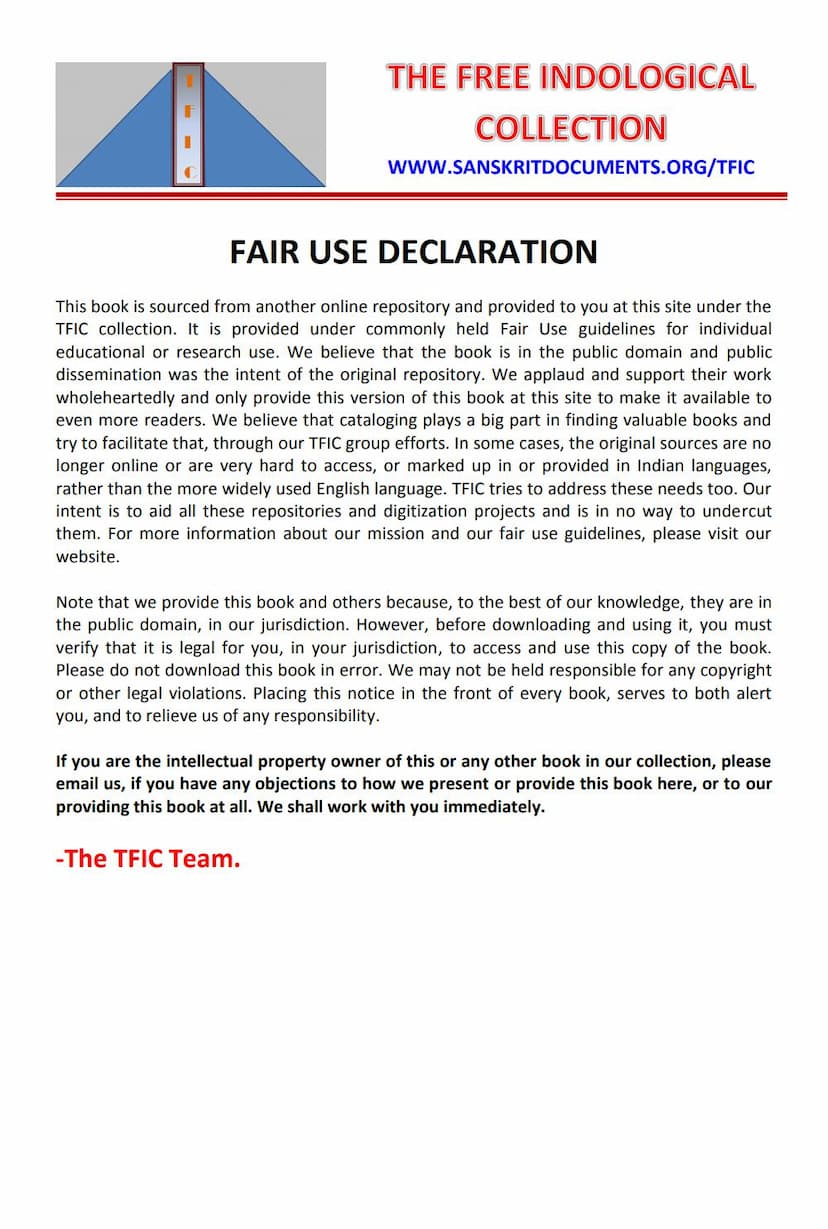Jainagam Sukti Sudha Part 01
Added to library: September 2, 2025

Summary
This is a comprehensive summary of the Jain text "Jainagam Sukti Sudha Part 01," compiled by Muni Shri Kalyan Rishi Ji and edited by Ratanlal Sanghvi.
Overall Purpose and Philosophy:
The primary goal of this book is to uplift the moral standing of the populace and help them experience true inner peace. It emphasizes that service to humanity cannot be genuine without character development. Jainism advocates for a life of detachment and spiritual morality, coupled with diligent service to humanity, as the path to self-peace. True renunciation in Jainism does not mean inactivity but rather engaging in selfless service with detachment and ethical conduct.
Key Themes and Concepts:
- The Importance of Character and Morality: The book strongly emphasizes the foundational role of character, discipline, and ethical conduct (Charitra) for individual and societal progress. It argues that a nation's civilization, culture, peace, and prosperity are built upon these moral pillars.
- The Meaning of Renunciation (Nivritti): Jain renunciation is not about passive withdrawal but about living a life of detachment and ethical conduct while serving society.
- Ahimsa (Non-violence): The book highlights Ahimsa as the supreme principle of Jainism, asserting that Jainism was the first religion to advocate for the renunciation of meat-eating among humans. It notes that Jainism's approach to Ahimsa is detailed, profound, and practical, influencing other religions.
- The Role of Tirthankaras: The teachings are often presented in the context of the Tirthankaras, particularly Lord Mahavir Swami, emphasizing their profound wisdom, tapasya, and sacrifices for the spiritual upliftment of humanity.
- The Self (Atman): Jainism's perspective on the soul is that it is inherently pure, eternal, and possesses infinite knowledge and power. The limitations experienced by the soul are due to the accumulation of karmas. The path to liberation lies in purifying the soul by shedding these karmas.
- Karma Theory: The book explains that karma is the driving force behind actions and their consequences, influencing one's destiny. It emphasizes that one is responsible for their own karma and its results.
- Syadvada (Anekantavada): Jainism's unique epistemological principle that truth is multifaceted and can be viewed from multiple perspectives. Syadvada aims to reconcile seemingly contradictory viewpoints and find a harmonious understanding of reality.
- The Nature of the Soul and God: Jainism posits that God is not a creator or controller of the universe but an ideal state of perfected souls. The universe is composed of two eternal elements: the sentient soul (jiva) and the non-sentient matter (pudgala). Each soul has the inherent potential to attain divinity through its own efforts.
- The Importance of Knowledge (Jnana) and Perception (Darshana): The book underscores the necessity of right knowledge and right perception as prerequisites for right conduct, which ultimately leads to liberation.
- The Fourfold Community (Chaturvidh Sangh): The text refers to the Jain community consisting of monks (shramana), nuns (shamani), laymen (shravaka), and laywomen (shravika), highlighting their collective role in upholding and propagating Jain principles.
- The Rarity of Human Birth and Spiritual Opportunity: The text repeatedly emphasizes the extreme rarity and preciousness of a human birth, especially one endowed with the opportunity to encounter the Jain teachings. This rarity serves as a motivation to make the most of this life for spiritual progress.
- The Essence of Virtue: Virtues like compassion, forgiveness, non-violence, truthfulness, celibacy, detachment, and control over the senses are repeatedly highlighted as essential for spiritual growth.
- The Impermanence of Life and Material Possessions: The teachings constantly remind the reader of the transient nature of life, youth, health, and material wealth, urging detachment and focus on spiritual pursuits.
Structure and Content:
The book is structured thematically, with each chapter or section dedicated to a specific virtue, spiritual principle, or aspect of Jain philosophy. It presents profound sayings (Suktis) from the Jain Agamas, accompanied by commentary, translation, and explanations of technical terms. The Suktis are drawn from various canonical texts, including:
- Dashvaikalik Sutra
- Uttaradhyayan Sutra
- Sutrakritanga Sutra
- Acharanga Sutra
- Uvāsaka-dasão Sutra
- Sthananga Sutra
- Nandi Sutra
The book includes:
- Prayers and Mangala Sutras: Opening verses to invoke auspiciousness and pay homage to the Tirthankaras and the Jain Sangha.
- Suktis (Sayings): A vast collection of ethical, philosophical, and spiritual aphorisms categorized by theme (e.g., Ahimsa, Truth, Charity, Renunciation, Karma, Soul, Liberation, etc.).
- Commentaries and Explanations: Each Sukti is explained with a commentary (Tika) to clarify its meaning and context.
- Indices and Appendices: The book includes a comprehensive index of Suktis, a glossary of technical terms (Paribhashik Shabd), and a detailed explanation of these terms.
- Dedication and Acknowledgements: The book is dedicated to the author's spiritual guru, Acharya Shri 1008 Shri Amolak Rishi Ji Maharaj, and acknowledges the financial contributions received for its publication.
Target Audience:
The book is intended to be useful for a wide audience, including children, students, teachers, monks, nuns, scholars, preachers, writers, and the general public. The inclusion of explanations and glossaries makes complex concepts accessible to a broader readership.
Overall Message:
"Jainagam Sukti Sudha Part 01" serves as a profound repository of Jain wisdom, guiding readers towards a life of ethical conduct, spiritual discipline, and ultimately, liberation. It offers practical guidance for daily life while delving into the deeper philosophical tenets of Jainism. The compilation aims to make the teachings of the Jain Agamas accessible and applicable for contemporary living.